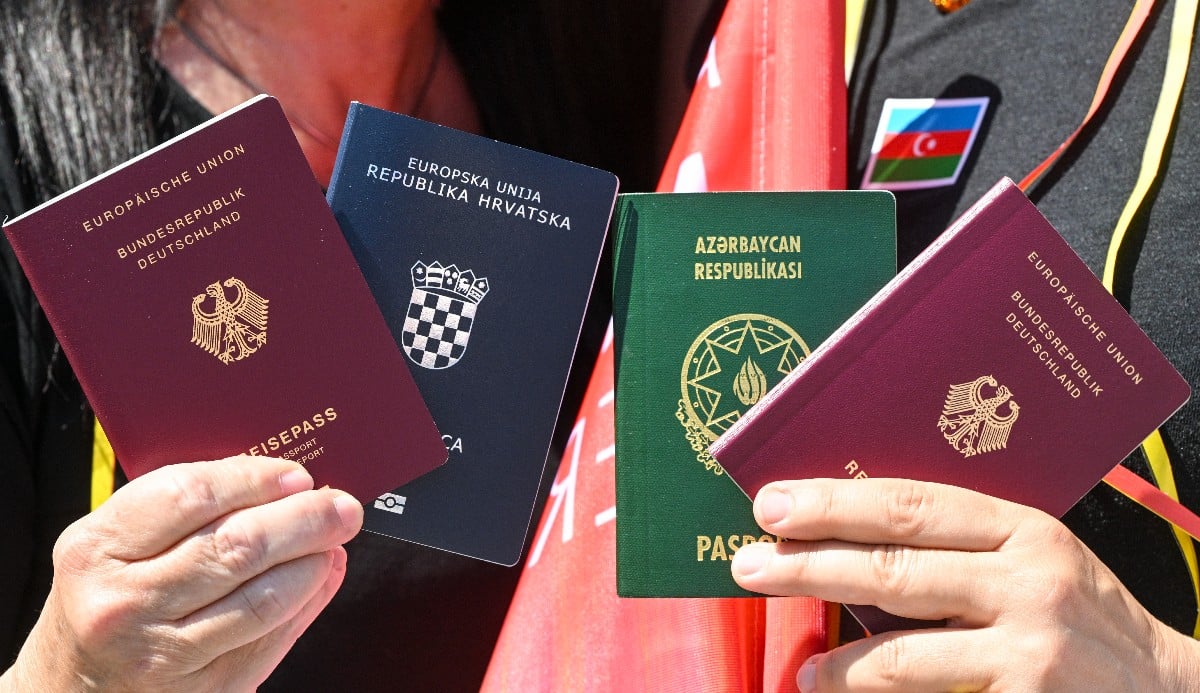January
In the new year, several changes come into force that will affect residents living in Germany.
Among them is the roll-out of the electronic patient file for people with statutory health insurance, which will mean everyone will be able to view their medical records virtually unless they object.
Another big change is the increase in price of the Deutschlandticket, Germany's travel pass for local transport throughout the country. It will cost €58 per month from January instead of €49.
READ ALSO:
Germany's new property tax rules will come into force in January, although so far the whole multi-year-long process has caused much confusion. Some households may have to pay more, and costs could also be passed on by landlords to tenants.
The EU's new border checks are currently fraught with uncertainty, but UK plans to introduce an extra visa waiver have already begun. The UK's Electronic Travel Authorisation (ETA) is a £10 visa waiver that must be applied for online in advance, and, once granted, lasts for two years.
The ETA requirement is already in place for citizens of certain countries, but will be extended to all non-EU nationals entering the UK from January 8th, and then to all EU nationals (with the exception of anyone travelling on a Irish passport) from April 2nd. Find full details HERE
There are also several money and tax changes planned in January that are expected to affect households' budgets in Germany, such as the increase in the minimum wage. Some of these are yet to be confirmed due to the political uncertainty.
The first holiday of the year takes place on the first day of 2025 - Neujahr. Here's the full list of public holidays in Germany - both regional and national.
Meanwhile, the eastern German city of Chemnitz is the 2025 European Capital of Culture so expect exhibitions, events and projects throughout the year.
February
Germans will go to the polls to vote in a snap election on February 23rd. The elections are being held more than six months ahead of the original date for the vote on September 28th. The vote was triggered by the Free Democrats (FDP) crashing out of the previous traffic-light coalition, leaving the Social Democrats (SPD) and Greens in a minority government.
The conservative Christian Democrats (CDU) and its Bavarian sister party, the CSU, are leading the polls currently with around 30-32 percent, followed by the far-right Alternative for Germany (AfD), which is hovering around 18-20 percent of the vote.
READ ALSO: What now as German chancellor loses vote of confidence?

The centre-left SPD is polling at around 15-17 percent, with the Greens polling at around 11 to 14 percent.
After the election, you can expect several weeks and possibly months of negotiations before a brand new coalition government comes together.
READ ALSO: Citizenship to Bürgergeld - The laws the German CDU want to scrap if they win power
February/March is also a traditional party time in Germany with Karneval happening (the celebrations are also called Fasching or Fastnacht depending on where you are). Weiberfastnacht (women’s carnival night) falls on the 27th of February and Rosenmontag is on the 3rd of March,
READ ALSO: What you need to know about celebrating carnival in Germany
Movie lovers should get these dates into their calendar: the Berlinale international film festival takes place from February 13th to 23rd.
March
The clocks go forward one hour at 2am on March 30th and you’ll immediately notice that the evenings get longer. There have been plans on an EU level to some day scrap the change between winter and summer time, but it doesn’t appear to be happening soon.
March 2025 also marks one year since the implementation of Germany's skilled worker immigration reform. In March 2024, some of the most significant changes were brought into force aimed at encouraging and making it easier for qualified workers to enter the job market in Germany.
Among them were the relaxation of family reunification rules. Anyone who arrives in Germany on a skilled worker permit or Blue Card is now able to bring their parents to live with them in Germany. If their spouse is also a permanent resident of Germany, the same applies parents-in-law. The law change has been bittersweet, because the relaxed rules do not apply to foreigners already in Germany before March 1st 2024.
READ ALSO: INTERVIEW - 'Germany's family reunion rules should be non-discriminatory'
The EU's new biometric passport checks known as Entry & Exit System (EES) have been repeatedly delayed and a proposed start date of November 10th 2024 was abandoned over fears of travel chaos. The start date is now only '2025' - so may happen in the first half of the year. Once (if) EES is introduced, ETIAS - a €7 visa waiver for non-EU visitors - is expected to follow six months later. Full details of how it all works here.
April
From April 2nd, the second part of UK's £10 ETA visa waiver kicks in, extending it to all EU citizens. Non-EU citizens will need one from January so from April 2nd onwards only people travelling on UK or Irish passports are exempt from this requirement.
There are two public holidays in Germany for Easter: Good Friday on April 18th and Easter Monday on April 21st. It kicks off a run of public holidays in Germany taking place in spring, with plenty of 'bridge days' to book off work to make your holidays last longer.
READ ALSO: How employees can make the most of Germany's public holidays in 2025
For those interested in music and history, the 'Thuringian Bach Weeks', a Baroque music festival in honour of Johann Sebastian Bach, takes place in Erfurt from April 11th to May 4th.
May
May 1st is a nationwide public holiday for Labour Day. Expect demonstrations across the country calling for more workers rights, and perhaps a few riots in Berlin, as well as a day off work.
Also in this month, the rules on surnames in Germany are set to be relaxed. In future, married couples will be able to choose a double name as their joint married name, which combines the surnames of both partners, and without a hyphen if they wish. Children can also be given double names, regardless of whether the parents have a double name. As things stand, the situation is rather complicated.
READ ALSO: Why Germany is changing its complicated rules around double surnames
Meanwhile, Eurovision 2025 is in neighbouring Switzerland, with the semi-finals in Basel set for May 13th and May 15th, and the grand final on Saturday, May 17th.
June
Tax declarations for the year 2023 for self employed people (and anyone else required to submit a return) who use an accountant have to be submitted to the tax man by June 2nd 2025.
A law aimed at improving accessibility in the digital realm comes into force on June 28th. Certain products and services, such as cash and ticket machines and banking have to become more user friendly. The Accessibility Strengthening Act aims to enable people with disabilities to fully participate in digital life.
June also marks one year of the Opportunity Card, a points-based visa which allows non-EU nationals who hold an academic degree or a professional qualification and have German or English language skills to come to Germany for a period of 12 months to find employment or to pursue additional qualifications with the aim of finding a job. In the first four months, just under 2,350 applications for the visa were submitted.
READ ALSO: How Germany's opportunity card will allow easier entries for foreign workers
And another big anniversary for foreigners in Germany: June 27th marks one year of the reformed citizenship law. Under the changes, foreign residents no longer have to give up their nationality to become German, while German nationals can apply for any foreign nationality without relinquishing their German nationality. Foreigners can also apply to become German after five years - and even after three years in cases of good integration and C1 level German skills.

However, there have been concerns over whether the changes will remain in place. The CDU, which has been the strongest party in polls ahead of elections, has said it wants to reverse the law if it wins power.
READ ALSO: Will Germany's citizenship law remain after new elections?
July
Summer is well and truly kicking in across Germany by July. That means trips to the lakes to cool down and plenty of ice cream. But it's also tax season.
The tax deadline for people who have to submit a declaration for the tax year 2024 is July 31st. Prepare well in advance to save you from panicking at the last minute.
READ ALSO: How to understand your German tax bill
August
August is known to be peak holiday month in Germany, with plenty of local businesses closing for a week or three (or four).
School holidays are also ongoing so expect pools and holiday resorts to be busier with families.
READ ALSO: Eight ways to enjoy summer like a German
September
It's back to school and work as the new term kicks in. It will also be back to office for the Bundestag or German parliament. Let's hope Germany has a functioning new government by then.
Germany's state leaders have drawn up a plan aimed at speeding up the process of recognising foreign qualifications in future. To ensure the plan is on track, the ministers want resolutions to be carried out by set deadlines, and a progress report should be submitted by September 30th.
Munich's famous folk festival, Oktoberfest, starts on September 20th and runs through to October 5th.
October
Germany's nationwide Day of Unity is on October 3rd, and it is a public holiday.
Berlin's stunning Festival of Lights is estimated to take place from October 3rd to the 12th, drawing tourists from around the world.
And on October 26th, it’s time to turn the clocks back one hour for winter time.
November
If the introduction of EES does happen in the early part of 2025 (and don't hold your breath) then we would be looking at an autumn start date for the ETIAS section.
This wouldn't affect foreigners living in Germany, but any non-EU citizens wishing to visit Germany, even for a short holiday or family visit, would require the €7 visa waiver, which must be arranged in advance. Full details here.
December
It's hard to predict where Germany will be in a year after the political upheaval. One thing we know for sure? Christmas Day lands on a Thursday. Perhaps even a budget for 2026 will have been agreed by then...

Comments